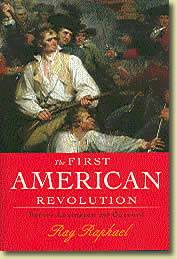

|
The First American Revolution: Before Lexington and ConcordThe New Press, 2002Hardcover and paperback “Wonderful writing, scrupulous research, and a truly revolutionary point of view. What more can one ask?” — Howard Zinn “Readers will learn more useful information about the American Revolution and its values from this book than from anything on the Founding Fathers that they are likely to encounter on their next trip to Barnes and Noble. … While recent world history provides many examples of decisive popular uprisings, America’s faith in and respect for democracy seems to have been waning of late. Raphael’s book serves as a salutary reminder of how quickly political mountains can move when ordinary people bank together and make their views known.” — St. Louis Post-Dispatch |
“Ray Raphael has produced an engaging narrative of western Massachusetts during the Revolution. … Raphael’s fine book will correct the fallacy that western Massachusetts was barely disturbed by the imperial crisis of the 1760s and early 1770s.” — Journal of American History “Written for both general and scholarly audiences, Ray Raphael's book is an unqualified success on one level and will provoke fruitful controversy among scholars on another. Here is a vivid account of the turbulent days in Massachusetts from the time the province received word of the Massachusetts Government Act on August 6, 1774, until battle broke out at Lexington and Concord the following April. … Raphael does a fine job of conveying the excitement Massachusetts experienced during these months when the Provincial Congress assumed the government outside of Boston. … Raphael's good sense and scholarship appears in his balanced treatment of issues Massachusetts historians have disputed. … The value of, and need for, such a fine account of the months immediately preceding Lexington and Concord cannot be disputed.” — Common-Place, an on-line scholarly journal “Historian Raphael contends that the United States’ war for independence did not begin in April 1775 with the “shot heard round the world.” Rather, it began the previous summer in rural towns like Worcester as patriots forced royal appointees to publicly resign their offices. … Raphael brings into clear focus events and identities of ordinary people who should share the historic limelight with the Founding Fathers. … Raphael makes a compelling case that these early events were critical to the success of the war that followed and should no longer escape our notice. His liberal use of primary sources (excerpts from town records, newspapers, letters, etc.), the authoritative secondary sources, and his meticulous care in footnoting will prove extremely useful for further study.” — Publisher’s Weekly “The shot fired in Lexington in April 1775 may have been ``heard 'round the world,'' but a California author argues the American Revolution actually began the summer before, when Massachusetts farmers and artisans wrested control of the colonies from the British government. ``The people who placed the Revolution in motion, who drove it forward, wore frocks and mud-caked boots, not dress suits and wigs,'' said Ray Raphael, author of the newly released book The First American Revolution: Before Lexington and Concord. ``These common people, democratic to the core, are our unheralded founding fathers,'' he said. Richly documented, Raphael's book challenges traditionally held beliefs that America's struggle for independence began when a group of ``renowned lawyers, merchants and slave-holding planters'' convened the first Continental Congress in Philadelphia in 1774. ``While they were considering whether or not to challenge British rule, the plain farmers and artisans of Massachusetts, guarding their liberties jealously and voting at every turn, wrestled control from the most powerful empire on earth,'' Raphael said during an interview from his home in California. The grassroots movement never made headlines, Raphael said, because it lacked charismatic, self-promoting leaders. ``These revolutionaries consciously disavowed all leadership,'' said Raphael, who stumbled upon ``occasional references to crowd actions in Massachusetts in 1774'' four years ago while researching material for another book. ``When they elected representatives, they did so on a day-to-day basis. It was the ultimate in term limits.'' Using previously unreported archival information from town records, newspapers and letters, Raphael writes that in the summer of 1774, common citizens throughout Massachusetts seized political power by forcing every Crown-appointed official in rural areas to resign. The uprisings began, Raphael writes, after the British Crown revoked the power of the colonists' votes, outlawed town meetings and replaced officials previously selected by the people with appointed officials. ``The citizens of Massachusetts refused to go along with any of this,'' Raphael said. And the protests began. In Great Barrington, 1,500 patriots filled the courthouse to prevent British judges from entering. In Worcester, 4,622 militiamen from 37 surrounding communities lined Main Street as Crown-appointed officials walked the gantlet, reciting their resignations 30 times each, ``so all could hear,'' according to Raphael. Similar movements took place in Taunton, Salem, Barnstable, Plymouth and Springfield, he said. ``The functionaries of British rule cowered and collapsed, no match for the collective force of patriotic farmers,'' Raphael writes in the book's introduction. The author contends that, contrary to popular belief, the Redcoats marched on Lexington and Concord in an attempt to take back a colony they had already lost to working-class patriots.” — Boston Herald |
|
